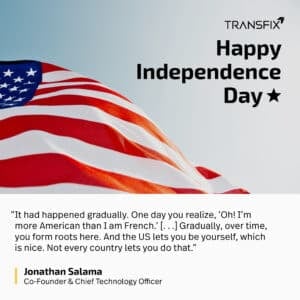In celebration of Independence Day, we are pleased to share our co-founder and CTO’s story of finding his home– both personally and professionally– in “the land of opportunity.”
Jonathan Salama (he/him) was born in Fontenay-sous-Bois (a suburb of Paris, France) in 1986; he moved to the United States at 18. He arrived on a student visa and met his future wife, Lindsay.
“My career would have looked very different if I had stayed. Transfix would not exist in France,” says Salama. “It’s a place where you work simply to make money . . . to maintain your lifestyle. Work to live, not for enthusiasm. But I like what I do. I work a lot. And I don’t think that would have been understood or rewarded there.” Would he have stuck out as being out of sync with France’s work culture? “Oh definitely: an engineering nerd.”

He also observes that few places compare to the US in terms of opportunities for entrepreneurism. “As much as they’re trying to change [in France]—when I left, they weren’t as friendly to entrepreneurs as the US has always been. There, you don’t really have the concept of venture capitalists who fund companies who have nothing, just an idea and two people. That doesn’t really exist—at least, not near the level of sophistication that there is here, and the trust in people. I probably wouldn’t have started a company there.”
A hands-on manager, Salama promotes an environment that encourages his engineers to take risks, experiment, and make new discoveries. He also works hard to align day-to-day life at Transfix with company values like equity and inclusivity. “There’s no difference in the way men and women engineers are treated at Transfix,” says Karina Ruzinov, Director of Engineering at Transfix. “We evaluate promotions based on merit. I think Jonathan and the rest of the Tech leadership is constantly aware how hard it is to be the only woman in the room and actively provide space for us to share our voice.”
As of the end of 2022, Jonathan will have spent more time living here than in his country of origin. It’s impossible to say whether someone’s adult personality was already cemented at 18, but his attitude—past and present—appears perfectly aligned with the American ideal of “enterprising spirit.” “I was born this way. I haven’t changed much,” he says of his overall temperament. If that is the case, he was destined to be a perfect fit with American culture—or, at least, the cultures of New York and San Francisco, which proved hospitable to his values and startup-style zeal.
Some of our Transfix teammates who are newer citizens shared heartwarming stories about the depth of emotion surrounding taking exams and being sworn in. One talked about her tender sense of communal connection when she pledges allegiance to the flag, and another talked about processing the heavy weight of his new responsibilities.
Salama’s experience has been equally impactful, but his casual and pragmatic approach prevails in his storytelling.
“It’s a lot like living with your partner for years and then getting married,” says Salama. “We had a party, but nothing changed. It happened gradually. One day you realize, ‘Oh! I’m more American than I am French.’ Gradually, over time, you form roots here. And the US lets you be yourself, which is nice. Not every country lets you do that.”
When asked about his hopes for the country’s future, he returns to two favorite topics: his daughters and DEIJ. “Everything I do is for my girls,” is something he says often, with conviction. And “diversity, equity, inclusion, justice” (DEIJ) efforts are an important part of Transfix’s mission, a central part of company culture set in place by its founders.
“A good future, providing people with equal opportunity . . . it all comes back to DEIJ. I am hopeful that by the time my children grow up, they won’t be blocked from doing whatever it is they want to do. I hope they won’t experience discrimination for being women or being Asian. I don’t need them to be, like, CEO or president; I just want them to be happy. And they can only be happy if they’re free to do what they want.”
If “being able to do what you want” is, indeed, a key component of happiness, it follows that the girls’ father– who found an environment where he’s free to work the way he prefers– is happy. He’s grateful to be in a time and place where his hard work pays off, and where he’s found opportunities to provide his children with a better life.
“Of course,” he adds with a laugh and a mischievous grin, “the best thing to do is become an engineer. My daughters can be anything they want! As long as what they want is to be engineers.”




